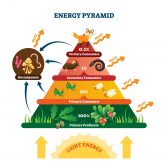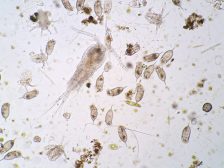Affinity chromatography
(Science: investigation) a technique of analytical chemistry used to separate and purify a biological molecule from a mixture, based on the attraction of the molecule of interest to a particular ligand which has been previously attached to a solid, inert substance.
The mixture is passed through a column containing the ligand attached to the stationary substance, so that the molecule of interest stays within the column while the rest of the mixture continues through to the end. Then, a different chemical is flushed through the column to detach the molecule from the ligand and bring it out separately from the rest of the mixture.
Dictionary > Affinity chromatography
You will also like...

Fruits, Flowers, and Seeds
This tutorial deals with the structure and function of flowers, fruits, and seeds. Also included here are the types of f..

Freshwater Community Energy Relationships – Producers & Consumers
This tutorial looks at the relationship between organisms. It also explores how energy is passed on in the food chain an..

Photosynthesis – Photolysis and Carbon Fixation
Photosynthesis is the process that plants undertake to create organic materials from carbon dioxide and water, with the ..

IQ, Creativity and Learning
Human intelligence provided the means to utilize abstract ideas and implement reasoning. This tutorial takes a further l..

Population Regulation in an Ecosystem
With regard to the population size of a species and what factors may affect them, two factors have been defined. They ar..

Freshwater Communities & Plankton
Planktons are microscopic organisms that live suspended in aquatic habitats. There are two groups: the phytoplanktons an..

